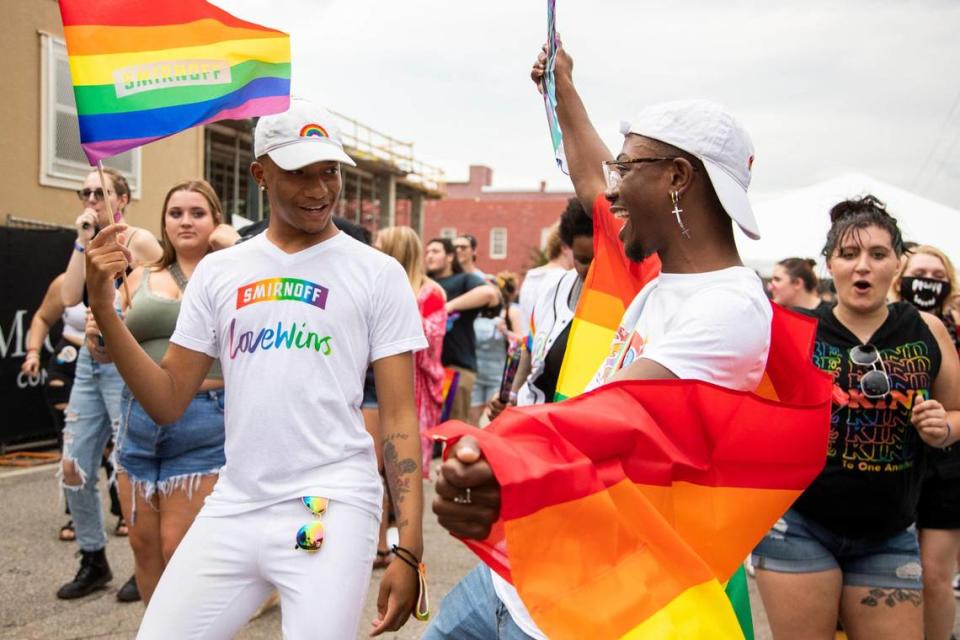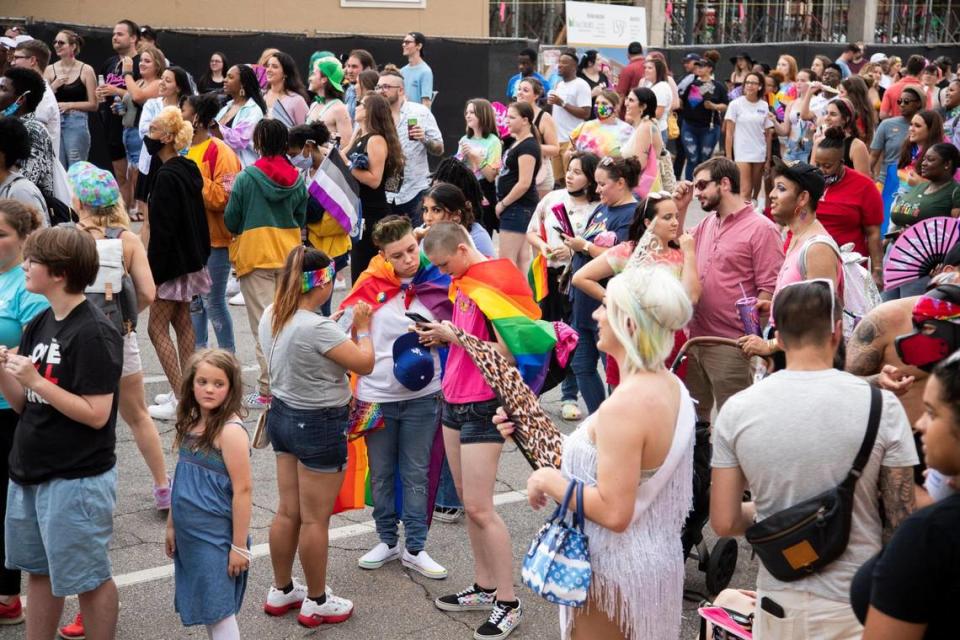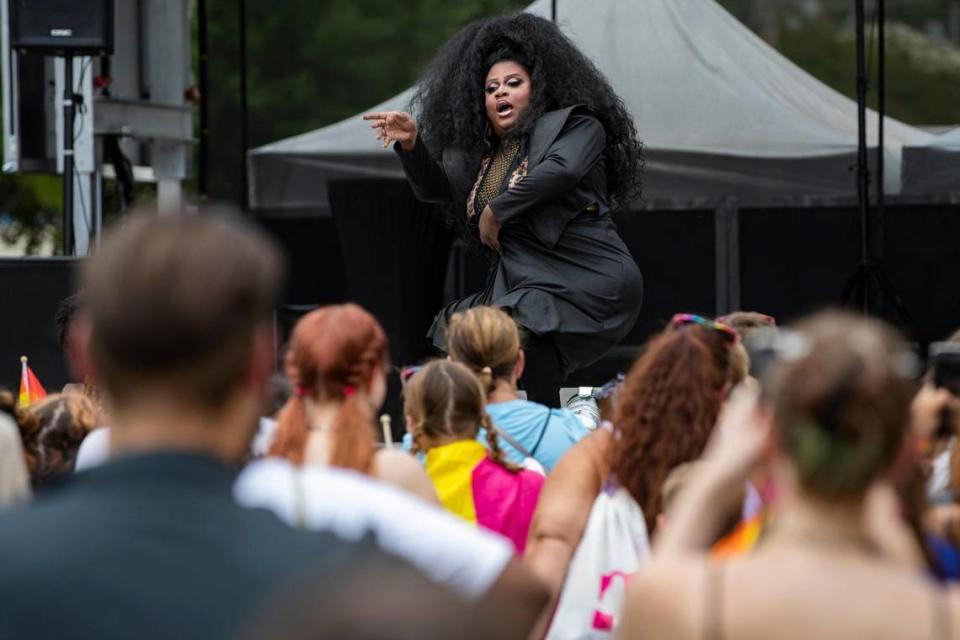The return of Pride: How SC’s LGBTQ+ community is reconnecting after COVID
- Oops!Something went wrong.Please try again later.
It’s almost impossible to go to Pride, a gay bar or really any queer space without hearing Whitney Houston’s “I Wanna Dance with Somebody.”
The song has long been one of those unofficial anthems of the LGBTQ+ community. A ballad about love and togetherness.
The moment the tune came on at OutFest, South Carolina Pride’s summertime bash, the crowd of hundreds near the stage broke out into song, screaming it into the atmosphere, a release of so many emotions pent up from a year at home, away from each other.
Houston’s song, in many ways, was a sign. After a year of the COVID-19 pandemic, the LGBTQ+ community in South Carolina was finally back together.
For many people at OutFest, it was their first time. They said they usually just waited until the fall for the main event, Columbia’s Famously Hot SC Pride Parade & Festival.

SC Pride, OutFest and every single other LGBTQ+ celebration last year was canceled or moved online, thanks to the pandemic. Gay bars were closed, and even when they reopened, many didn’t want the risk of catching or spreading COVID-19.
So when OutFest arrived, queer people from all over the state, and even neighboring Georgia and North Carolina, traveled to Columbia to see others like themselves, to feel at home for the first time since the pandemic began.
“I feel so comfortable, which is so not how I’m used to feeling,” USC student Becca Ferguson said at the event. This year was her first time attending. “Just seeing everyone’s artistic capabilities and what they can put in an outfit like is so motivating to me. I’m just standing here smiling, and I’ve been here for (hours). I don’t know — I just can’t get enough of it.”
Canceling much more than Pride
The organizers of LGBTQ+ Pride events around the state knew the moment COVID-19 shut down the U.S. in mid-March that the chances of being able to hold their marquee celebrations were slim.
The virus poses a particularly dire risk for members of the queer community, who have some of the highest rates of the HIV, a potentially deadly immunosuppressive disease, in the nation. The Centers for Disease Control and Prevention reports that one in six gay and bisexual men are expected to be diagnosed with HIV in their lifetimes. The risk is even higher for transgender women, more than 40% have HIV, according to a CDC study of seven cities from 2014-2018.
South Carolina Black Pride president Darius Jones said he knew holding an in-person Pride celebration wasn’t worth the risk. Many of the people who attend the annual event in Columbia are older members of the queer community who have had HIV for decades, he said.
“My number one concern was honestly the safety of our community members,” Jones said. “It’s just so crazy because I got so much backlash — ‘We need to have a party! We need to do this!’”
Last year was supposed to be 15th anniversary of SC Black Pride. Now, Jones said they are “trying to pick up where they left off” but are planning a slightly scaled-down festival because funding and sponsorhip has been more scarce than in years past.
“It’s definitely happening. We don’t have the caliber of it that we planned on last year, but we’re definitely going to have a huge event,” Jones said.
SC Pride president Jeff March said he waited as long as he could before canceling OutFest last June and the Pride Parade and Festival in October. He knew people were tired of being stuck at home, away from other members of the community. He knew that LGBTQ+ service workers and performers, like Drag Queens, needed the money the festival would bring.
He even thought about trying to host a virtual event but decided the organization would be better off saving as much money as possible to ensure OutFest and Pride could return in 2021.
“When we had to officially cancel, it just broke my heart,” March said. “We still kind of hung on and thought, ‘Anything could change. We’ll be ready anyway.’
“It was hard to take a year off. It was hard to make the right decision. We don’t know if we made the right decision in not going virtual. But we did the only thing we could do, which was hold on to our funding,” he said.

Pride events often serve as fundraisers for charitable organizations that support the queer community.
Park Circle Pride, a new festival started this year in North Charleston, was a major boon for the Alliance for Full Acceptance and We Are Family, two queer nonprofits that received a cut of the proceeds.
Alliance’s president Colleen Condon said Park Circle Pride provided critical support for her organization, which had to cancel its annual November gala that typically brings in more than $200,000.
“We don’t know yet how much we’re going to get from this opportunity, but we appreciate the donations. We also appreciate the opportunity to make more connections with people who may not have been active with AFFA or We Are Family before,” Condon said.
‘Losing our sense of community’
The LGBTQ+ community has long struggled with having enough safe and welcoming spaces to support its members. In the latter half of the 20th century, bars were often the only safe havens it had. As acceptance to the community grew, so did the number of spaces, for a time.
Acceptance came at a cost. Many LGBTQ+ bars around the country have closed in the last 20 years because they weren’t as essential. Queer people can meet online, in school or at work, without having to hide.
At their heights, Myrtle Beach, Columbia and Charleston used to have around five gay bars each. Now, Myrtle Beach and Columbia each have two. Charleston has just one.
Despite their decline, queer spaces are still essential, activists and Pride organizers say. They provide connections to the broader community, support networks and, in many cases, access to health care.
Without bars, the community’s iconic performers, Drag Queens, had to resort to online shows or asking for donations on sites like GoFundMe. Service workers at those same bars, who often are queer themselves, were also left behind.
“Overall I was very concerned,” Jones said. “We were losing our sense of community. The only ways we had were in group text messages or Facebook or gay Twitter. There were avenues, but they were not physical avenues.”
Pride returns
Park Circle Pride was one of the first queer celebrations to return since the start of the pandemic. Simon Cantlon, the event organizer, created the six-day festival after the owner of Commonhouse Aleworks approached him two years ago requesting his help in bringing a new Pride festival to their community.
Cantlon originally planned the event for 2020 but canceled once the risks posed by COVID-19 became clear.
Despite being a brand-new event, he and other organizers said that hundreds of people — more than a thousand on the busiest days — attended. Many were members of the queer community, but many straight allies and families attended, as well, he said.
“So many people said to me, ‘I’ve seen so many faces I haven’t seen in a year,’” Cantlon said. “It’s like this giant reunion.”
That same weekend, SC Pride’s Jeff March was putting on Outfest. It was the festival’s third year, and he created it so Columbia would have something to celebrate during the “official” Pride month of June like other cities, including New York and San Francisco, around the country. He was apprehensive in the weeks leading up to it, unsure of how many people would attend.

Turnout quadrupled compared to 2019.
“I was peeking out from behind backstage at one point early on, and I can’t deny that there were tears coming out of my eyes behind my sunglasses because I was like, ‘This is amazing,’” March said. “We were more than ready to get back together again.”
USC student McKenzi Norris said being at OutFest finally made him feel like he wasn’t alone.
“I just like knowing that there’s a community here because — it’s kind of cliche — but sometimes it’s lonely,” Norris said. “Knowing that other people exist, who aren’t straight, is nice.”
Condon, of the Alliance for Full Acceptance, said even after so many decades of progress for the queer community, Pride still serves an important purpose in the social and mental well-being of LGBTQ+ people. Nowhere else can such a wide range of queer people gather and, for once, feel like they are normal.
“I’m not sure people always realize how important Pride is,” Condon said. “It’s special being in a place where it’s the norm to be holding the hand of somebody who’s the same sex as yourself, to have so many people being gender fluid and non binary and trans.”

